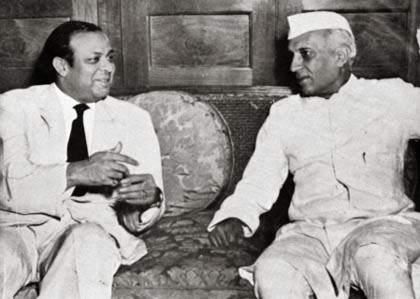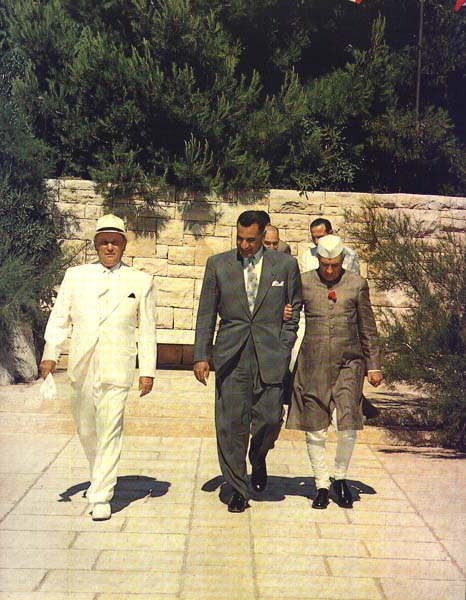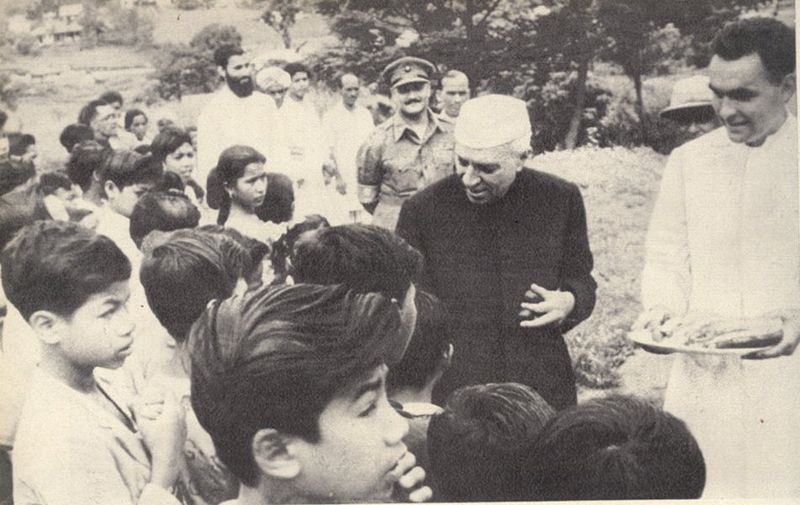<Back to Index>
- Geologist Charles Lyell, 1797
- Painter Oscar Claude Monet, 1840
- 1st Prime Minister of India Jawaharlal Nehru, 1889
PAGE SPONSOR
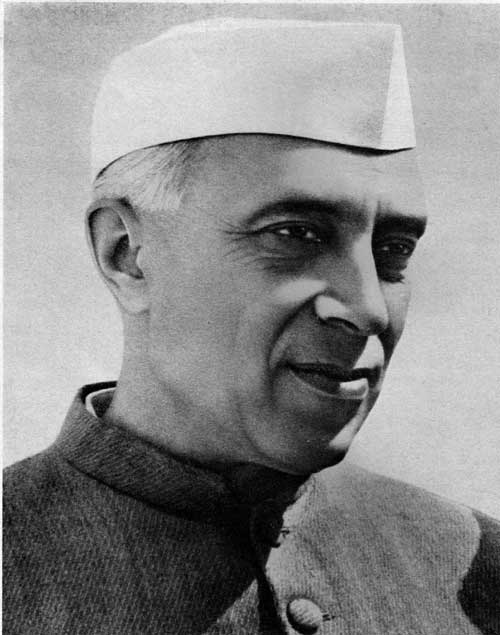
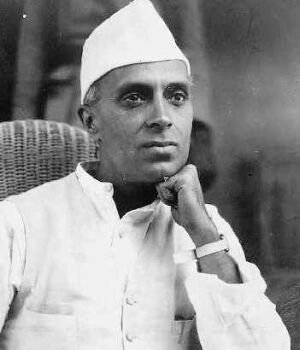
Jawaharlal Nehru (Hindi: जवाहरलाल नेहरू; 14 November 1889 – 27 May 1964) was an Indian statesman who was the first (and to date the longest-serving) prime minister of India, from 1947 until 1964. A leading figure in the Indian independence movement, Nehru was elected by the Congress Party to assume office as independent India's first Prime Minister, and re-elected when the Congress Party won India's first general election in 1952. As one of the founders of the Non-aligned Movement, he was also an important figure in the international politics of the post-war era. He is frequently referred to as Pandit Nehru ("pandit" being a Sanskrit and Hindi honorific meaning "scholar" or "teacher") and, specifically in India, as Panditji (with "-ji" being a suffix to the honorific).
The son of a wealthy Indian barrister and politician, Motilal Nehru, Nehru became a leader of the left wing of the Indian National Congress when still fairly young. Rising to become Congress President, under the mentorship of Mahatma Gandhi, Nehru was a charismatic and radical leader, advocating complete independence from the British Empire.
In the long struggle for Indian independence, in which he was a key
player, Nehru was eventually recognized as Gandhi's political heir.
Throughout his life, Nehru was also an advocate for Fabian socialism and the public sector as the means by which long-standing challenges of economic development could be addressed by poorer nations. Jawaharlal Nehru was educated in Britain at the independent boy's school, Harrow School and Trinity College, Cambridge. During his time in Britain, Nehru was known as Joe Nehru. Nehru was given the singular honour of raising the flag of independent India in New Delhi on 15 August 1947, the day India gained
Independence. Nehru's appreciation of the virtues of parliamentary
democracy, secularism and liberalism, coupled with his concerns for the
poor and underprivileged, are recognised to have guided him in
formulating policies that influence India to this day. They also
reflect the socialist origins of his worldview. His long tenure was
instrumental in shaping the traditions and structures of independent
India. He is sometimes referred to as the "Architect of Modern India". His daughter, Indira Gandhi, and grandson, Rajiv Gandhi, also served as Prime Ministers of India. Gita Sahgal –
a writer and journalist who addresses issues of feminism,
fundamentalism, and racism, director of prize-winning documentary films, and human rights activist – is his grand-niece.
On
15 January 1941 Gandhiji said, "Some say Pandit Nehru and I were
estranged. It will require much more than difference of opinion to
estrange us. We had differences from the time we became co-workers and
yet I have said for some years and say now that not Rajaji (Chakravarti Rajagopalachari) but Nehru will be my successor." Nehru and his colleagues had been released as the British Cabinet Mission arrived to propose plans for transfer of power. Once
elected, Nehru headed an interim government, which was impaired by
outbreaks of communal violence and political disorder, and the
opposition of the Muslim League led by Muhammad Ali Jinnah, who were demanding a separate Muslim state of Pakistan. After failed bids to form coalitions, Nehru reluctantly supported the partition of India, according to a plan released by the British on 3 June 1947. He took office as the Prime Minister of India on 15 August, and delivered his inaugural address titled "A Tryst With Destiny" "Long
years ago we made a tryst with destiny, and now the time comes when we
shall redeem our pledge, not wholly or in full measure, but very
substantially. At the stroke of the midnight hour, when the world
sleeps, India will awake to life and freedom. A moment comes, which
comes but rarely in history, when we step out from the old to the new,
when an age ends, and when the soul of a nation, long suppressed, finds
utterance. It is fitting that at this solemn moment we take the pledge
of dedication to the service of India and her people and to the still
larger cause of humanity." However, this period was marked with intense communal violence. This violence swept across the Punjab region, Delhi, Bengal and other parts of India. Nehru conducted joint tours with
Pakistani leaders to encourage peace and calm angry and disillusioned
refugees. Nehru would work with Maulana Azad and other Muslim leaders
to safeguard and encourage Muslims to remain in India. The violence of
the time deeply affected Nehru, who called for a ceasefire and UN intervention to stop the Indo-Pakistani War of 1947. Fearing communal reprisals, Nehru also hesitated in supporting the annexation of Hyderabad State. In
the years following independence, Nehru frequently turned to his
daughter Indira to look after him and manage his personal affairs.
Under his leadership, the Congress won an overwhelming majority in the
elections of 1952. Indira moved into Nehru's official residence to
attend to him and became his constant companion in his travels across
India and the world. Indira would virtually become Nehru's chief of staff. Nehru presided over the introduction of a modified, Indian version of state planning and control over the economy. Creating the Planning commission of India, Nehru drew up the first Five-Year Plan in
1951, which charted the government's investments in industries and
agriculture. Increasing business and income taxes, Nehru envisaged a mixed economy in
which the government would manage strategic industries such as mining,
electricity and heavy industries, serving public interest and a check
to private enterprise. Nehru pursued land redistribution and
launched programmes to build irrigation canals, dams and spread the use
of fertilizers to increase agricultural production. He also pioneered a
series of community development programs aimed at spreading diverse cottage industries and increasing efficiency into rural India. While encouraging the
construction of large dams (which Nehru called the "new temples of
India"), irrigation works and the generation of hydroelectricity, Nehru also launched India's programme to harness nuclear energy. For
most of Nehru's term as prime minister, India would continue to face
serious food shortages despite progress and increases in agricultural
production. Nehru's industrial policies, summarised in the Industrial
Policy Resolution of 1956, encouraged the growth of diverse
manufacturing and heavy industries, yet
state planning, controls and regulations began to impair productivity,
quality and profitability. Although the Indian economy enjoyed a steady
rate of growth, chronic unemployment amidst widespread poverty
continued to plague the population. Jawaharlal
Nehru was a passionate advocate of education for India's children and
youth, believing it essential for India's future progress. His
government oversaw the establishment of many institutions of higher
learning, including the All India Institute of Medical Sciences, the Indian Institutes of Technology and the Indian Institutes of Management.
Nehru also outlined a commitment in his five-year plans to guarantee
free and compulsory primary education to all of India's children. For
this purpose, Nehru oversaw the creation of mass village enrollment
programmes and the construction of thousands of schools. Nehru also
launched initiatives such as the provision of free milk and meals to
children in order to fight malnutrition. Adult education centres,
vocational and technical schools were also organised for adults,
especially in the rural areas. Under
Nehru, the Indian Parliament enacted many changes to Hindu law to
criminalize caste discrimination and increase the legal rights and
social freedoms of women.
A system of reservations in government services and educational
institutions was created to eradicate the social inequalities and
disadvantages faced by peoples of the scheduled castes and scheduled
tribes. Nehru also championed secularism and religious harmony,
increasing the representation of minorities in government. Nehru
led newly independent India from 1947 to 1964, during its first years
of freedom from British rule. Both the United States and the Union
of Soviet Socialist Republics competed to make India an ally throughout the
Cold War. On the international scene, Nehru was a champion of pacifism and a strong supporter of the United Nations. He pioneered the policy of non-alignment and co-founded the Non-Aligned Movement of
nations professing neutrality between the rival blocs of nations led by
the U.S. and the U.S.S.R. Recognising the People's Republic of China
soon after its founding (while most of the Western bloc continued relations with the Republic of China),
Nehru argued for its inclusion in the United Nations and refused to
brand the Chinese as the aggressors in their conflict with Korea. He sought to establish warm and friendly relations with China despite the invasion of Tibet in 1950, and hoped to act as an intermediary to bridge the gulf and tensions between the communist states and the Western bloc. Meanwhile, Nehru had promised in 1948 to hold a plebiscite in
Kashmir under the auspices of the U.N. but, as Pakistan failed to pull
back troops in accordance with the UN resolution and as Nehru grew
increasingly wary of the U.N., he declined to hold a plebiscite in
1953. He ordered the arrest of the Kashmiri politician Sheikh Abdullah, whom he had previously supported but now suspected of harbouring separatist ambitions; Bakshi Ghulam Mohammad replaced him. His policy of pacifism and appeasement with respect to China also came unraveled when China annexed Aksai Chin, the region of Kashmir adjoining Tibet in 1962 that led to the Sino-Indian war. Nehru was hailed by many for working to defuse global tensions and the threat of nuclear weapons.
He commissioned the first study of the human effects of nuclear
explosions, and campaigned ceaselessly for the abolition of what he
called "these frightful engines of destruction." He also had pragmatic
reasons for promoting de-nuclearisation, fearing that a nuclear arms
race would lead to over-militarisation that would be unaffordable for
developing countries such as his own. In 1956 he had criticised the joint invasion of the Suez Canal by the British, French and Israelis.
Suspicion and distrust cooled relations between India and the U.S.,
which suspected Nehru of tacitly supporting the Soviet Union. Accepting
the arbitration of the UK and World Bank, Nehru signed the Indus Water Treaty in 1960 with Pakistani ruler Ayub Khan to resolve long-standing disputes about sharing the resources of the major rivers of the Punjab region. Nehru
had led the Congress to a major victory in the 1957 elections, but his
government was facing rising problems and criticism. Disillusioned by
intra-party corruption and bickering, Nehru contemplated resigning but
continued to serve. The election of his daughter Indira as Congress
President in 1959 aroused criticism for alleged nepotism,
although actually Nehru had disapproved of her election, partly because
he considered it smacked of "dynastism"; he said, indeed it was "wholly
undemocratic and an undesirable thing", and refused her a position in
his cabinet.
Indira herself was at loggerheads with her father over policy; most
notably, she used his oft-stated personal deference to the Congress Working Committee to push through the dismissal of the Communist Party of India government in the state of Kerala, over his own objections.
Nehru began to be frequently embarrassed by her ruthlessness and
disregard for parliamentary tradition, and was "hurt" by what he saw as
an assertiveness with no purpose other than to stake out an identity
independent of her father. Although the Pancha Sila (Five
Principles of Peaceful Coexistence) was the basis of the 1954
Sino-Indian treaty over Tibet, in later years, Nehru's foreign policy
suffered through increasing Chinese antagonism over border disputes and
Nehru's decision to grant asylum to the Dalai Lama. After years of failed negotiations, Nehru authorized the Indian Army to annex Goa from Portugal in 1961. While increasing his popularity, Nehru received criticism for opting for military action. In
the 1962 elections, Nehru led the Congress to victory yet with a
diminished majority. Opposition parties ranging from the right-wing Bharatiya Jana Sangh and Swatantra Party, socialists and the Communist Party of India performed well. In
a matter of months, the border disputes with China turned into open
conflict. Nehru assumed that as former victims of imperialism (India
being a colony itself) they shared a sense of solidarity, as expressed
in the phrase "Hindi-Chini bhai bhai" (Indians and Chinese are
brothers). He was dedicated to the ideals of brotherhood and solidarity
among developing nations.
Nehru, credulously, did not believe that one fellow Socialist country
would attack another; and in any event, he felt secure behind the
impregnable wall of ice that is the Himalayas. Both proved to be severe
miscalculations of China's intentions and military capabilities.
Following reports of his intention to confront Chinese occupation of
the disputed areas — summarised in a memorable statement that he had
asked the Army to "throw them (Chinese) out" - China launched a
pre-emptive attack. In a matter of days, a Chinese invasion of northeastern India exposed the weaknesses of India's military as Chinese forces came as far as Assam. Widely criticised for his government's insufficient attention to defence, Nehru was forced to sack the defence minister Krishna Menon and
seek U.S. military aid. Nehru's health began declining steadily, and he
was forced to spend months recuperating in Kashmir through 1963. Some
historians attribute this dramatic decline to his surprise and chagrin
over the invasion of India by the Chinese, which he perceived as a
betrayal of trust. Upon his return from Kashmir in May 1964, Nehru suffered a stroke and later a heart attack. He died in the early hours of 27 May 1964. Nehru was cremated in accordance with Hindu rites at the Shantivana on the banks of the Yamuna River, witnessed by hundreds of thousands of mourners who had flocked into the streets of Delhi and the cremation grounds.
